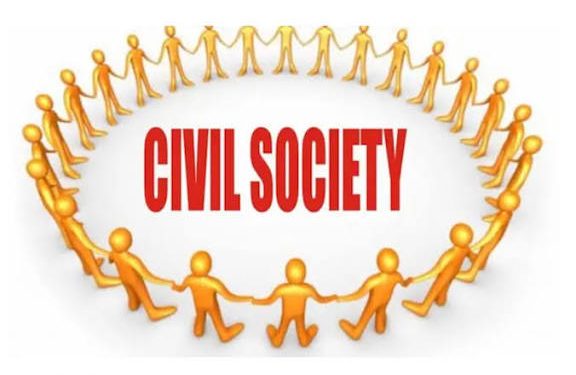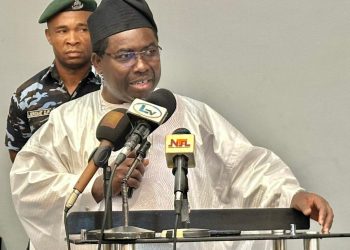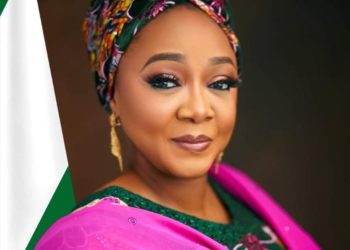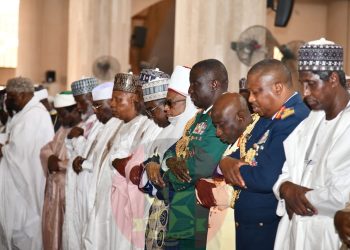By Nkechi Eze
A coalition of prominent Nigerian civil society organizations has demanded an urgent and impartial investigation into the Minister of the Federal Capital Territory (FCT), Nyesom Wike, following allegations of illicit enrichment, concealment of assets, and violations of the country’s asset declaration laws.
In a joint statement issued on Thursday, the coalition called on key anti-corruption and accountability agencies—the Economic and Financial Crimes Commission (EFCC), the Independent Corrupt Practices and Other Related Offences Commission (ICPC), the Code of Conduct Bureau (CCB), the National Judicial Council (NJC), and the Federal Inland Revenue Service (FIRS)—to take swift, coordinated action. The groups insisted that political influence or status must not be allowed to shield any official from scrutiny.
“No public official, regardless of their rank or influence, should be placed above the law,” the coalition declared. “Selective enforcement corrodes public trust and undermines the legitimacy of Nigeria’s anti-corruption framework.”
They stressed that the Code of Conduct Bureau bears a special responsibility to ensure that politically exposed persons are not only required to declare their assets at the point of assumption or exit from office, but that such declarations are continuously monitored and verified during their tenure, free from political interference.
The statement cited credible reports linking Minister Wike and his spouse, Justice Eberechi Suzzette Nyesom-Wike of the Court of Appeal, to multiple undeclared assets, including three luxury lakeside properties in Winter Springs, Seminole County, Florida, purchased between 2021 and 2023 and subsequently transferred to their children. Other allegations include the use of shell structures to conceal ownership, the acquisition of luxury vehicles, and the allocation of high-value properties in Abuja to members of the minister’s family.
The coalition further pointed to long-standing allegations of the diversion of $300 million intended for environmental remediation in Ogoniland, which was allegedly channeled into private business interests, including a retail chain in Port Harcourt. In addition, Senator Ireti Kingibe, representing the FCT, has accused the minister of illegal land allocations in Abuja, with reports suggesting that several premium plots were unlawfully assigned to relatives of the minister.
“These allegations, if substantiated, represent not only violations of Nigeria’s anti-corruption statutes but also a profound betrayal of public trust,” the statement warned.
The groups demanded a comprehensive audit of Wike’s asset declarations both as governor and as minister, a forensic review of financial transactions linked to him and his immediate family, and the transparent publication of all investigative findings, to be followed by legal action where violations are confirmed. They argued that how this case is handled will be a litmus test for the independence and credibility of Nigeria’s anti-corruption institutions.
The coalition urged the EFCC, ICPC, CCB, NJC, and FIRS to open coordinated inquiries without delay, publish timelines, and communicate investigative procedures transparently to the public. It warned that a failure to act decisively would embolden corruption and impunity, while a transparent probe would help restore legitimacy to Nigeria’s governance institutions. The statement also appealed to international watchdogs, development partners, and the global transparency community to closely monitor developments, insisting that credible accountability in this case would reinforce Nigeria’s anti-corruption commitments and send a strong signal globally that public service in the country is anchored on integrity and equity before the law.
Beyond the legal dimensions, the coalition said the matter underscores the dangerous culture of impunity in governance, noting that when accountability institutions hesitate or apply the law selectively, corruption becomes a rational choice. On the other hand, consistent and impartial enforcement strengthens deterrence and shifts norms towards compliance. The statement stressed that anti-corruption must be understood not only as a legal requirement but as a behavioural signal that defines societal expectations about what is tolerated and what is punished.
The coalition called for the present moment to be used to forge a national consensus on tackling corruption among politically exposed persons. It recommended convening a broad dialogue involving civil society, media, political parties, and international partners to deliberate on the implications of the allegations against Wike and the broader challenge of corruption among elites. It also urged the launch of public awareness campaigns to highlight the dangers of corruption, emphasize the importance of truthful asset declarations, and empower citizens to demand accountability.
The statement was signed by 21st Century Community Empowerment for Youth Initiative, Accountability Lab Nigeria, Abuja School of Social and Political Thought, Africa Network for Environment and Economic Justice (ANEEJ), African Centre for Leadership, Strategy & Development (Centre LSD), African Centre for Media & Information Literacy (AFRICMIL), Alliance on Surviving COVID 19 and Beyond (ASCAB), Amnesty International Nigeria, Borno Coalition for Democracy and Progress (BOCODEP), BudgIT Foundation, Center for Fiscal Transparency and Public Integrity, Centre for Democracy and Development (CDD), Centre for Democratic Research and Training (CRDDERT), Centre for Information Technology and Development (CITAD), Centre for Journalism Innovation and Development (CJID), Centre for Social Justice, Civil Society Legislative Advocacy Centre (CISLAC), Conscience for Human Rights and Conflict Resolution (CHRCR), Corporate Accountability and Public Participation Africa (CAPPA), Emma Ezeazu Centre for Good Governance and Accountability, Environmental Rights Action/Friends of the Earth Nigeria (ERA), #FixPolitics, Global Rights, Good Governance Team, Health of Mother Earth Foundation (HOMEF), Human and Environmental Development Agenda (HEDA Resource Centre), Kebetkache Women Development and Resource Centre, Lawyers Alert, Media Rights Agenda, Mothers and Marginalized Advocacy Centre (MAMA Centre), Organization for Community Civic Engagement (OCCEN), Partners West Africa Nigeria, Peering Advocacy and Advancement Centre in Africa (PAACA), PRAWA International, Procurement Observation and Advocacy Initiative, Resource Centre for Human Rights and Civic Education (CHRICED), Rule of Law and Accountability Advocacy Centre (RULAAC), Say No Campaign Nigeria, Social Action, Socio-Economic Rights and Accountability Project (SERAP), Socio-Economic Research and Development Centre (SERDEC), Spaces for Change, State of the Union (SOTU), Tax Justice and Governance Platform, Transition Monitoring Group (TMG), West Africa Civil Society Institute (WACSI), Women Advocate Research and Documentation Centre (WARDC), Women in Media Communication Initiative (WIM), Yiaga Africa, Zero Corruption Coalition (ZCC), and Girl Child Concern (GCC).
The coalition concluded that Nigeria must seize this moment to demonstrate that its laws apply equally to all, warning that the credibility of the country’s anti-corruption drive will depend on how this case is resolved.
















